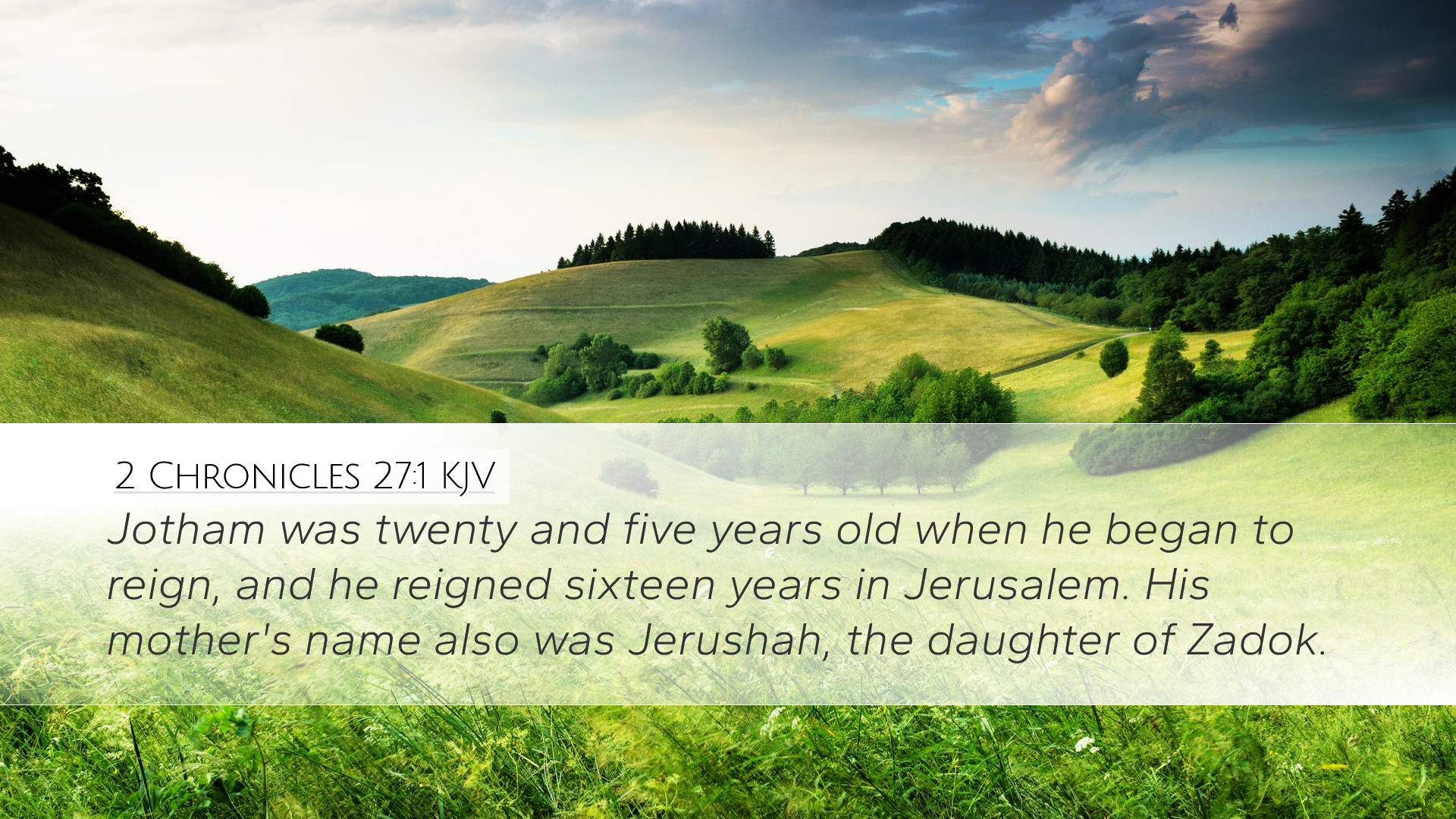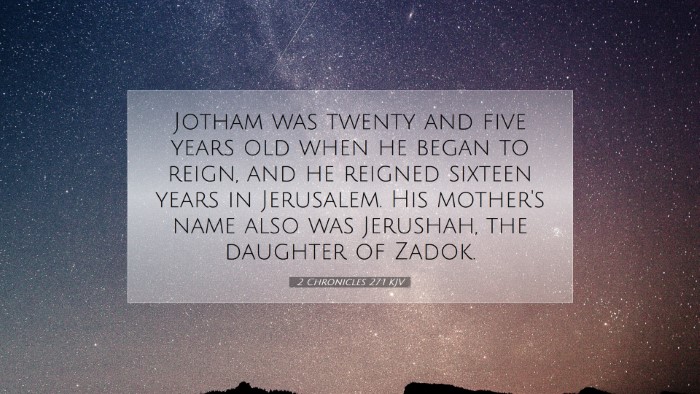Commentary on 2 Chronicles 27:1
2 Chronicles 27:1 reads, "Jotham was twenty-five years old when he became king, and he reigned for sixteen years in Jerusalem. His mother’s name was Jerusha daughter of Zadok." This verse introduces the reign of King Jotham, setting the stage for an exploration of his character, achievements, and the theological implications of his rule.
Introduction to King Jotham
Jotham is noted for being a king who followed in the footsteps of his father, Uzziah (or Azariah). The introduction of his reign at the young age of twenty-five signifies the transitional nature of leadership in Judah during this period. Commentators highlight the significance of his age, interpreting it as a period ripe for development, where youthful vigor and potential can meet the challenge of governance.
Significance of Age
-
Youth and Responsibility: The youthful age of Jotham underscores the idea that effective leadership is not solely tied to experience, but also to vigor and new perspectives. As Matthew Henry notes, "Even young men may be made instruments of good in their generation."
-
Potential for Reform: Jotham’s youth implies potential for reform and vigor in advancing Judah’s spiritual and national interests.
Contextual Background
To thoroughly understand the significance of Jotham's reign, it is essential to contextualize it within the broader narrative of Judah's history. Jotham follows his father, Uzziah, whose reign was marked by both achievements and a tragic downfall due to pride (2 Chronicles 26:16). Consequently, Jotham's ascension to the throne comes with the backdrop of national strength and potential vulnerabilities.
Theological Themes
-
Divine Providence: The installation of kings is often viewed through the lens of divine providence in the Old Testament. Jotham's reign can be seen as part of God’s overarching plan for Israel, reflecting the principle that God raises leaders for His purposes.
-
Balance of Power: The reign of Jotham illustrates the tension between power and responsibility—particularly in light of his father's failures. Commentators argue that Jotham represents a divine hope for restitution in leadership.
Character of Jotham
Jotham’s character is crucial in interpreting his reign. He is presented positively compared to many of his successors. Albert Barnes comments, "Jotham did what was right in the eyes of the Lord, just as his father Uzziah had done." However, the contrast lies in the lack of pride and the humble acceptance of his role before God, which kept him from the fate that befell Uzziah.
Righteousness and Spiritual Leadership
-
Spiritual Commitment: Jotham’s dedication to God was manifested in his actions. Unlike Uzziah, who overstepped his bounds, Jotham maintained the proper worship of Yahweh, which was key to his success. Clarke emphasizes that "the stability of a king depends on his piety."
-
Political Decisions: His righteous rule is demonstrated through political decisions that stabilized Judah. He fortified cities, and stands in contrast to the later kings whose lead resulted in moral and spiritual decline.
A Mother’s Influence
The mention of Jotham's mother, Jerusha, daughter of Zadok, adds depth to his character. It is an invitation to explore the familial influences on personal faith and governance in ancient Israel. Jerusha’s lineage connected Jotham to the priestly class, which may have reinforced his commitments.
Role of Women in Biblical History
-
Influence of Maternal Figures: Jotham's mother's background speaks to the significant, though often understated, role women have played in the biblical narrative. Many commentators posit that her influence likely nurtured his spiritual character.
-
Legacy of Faith: The positive legacy passed down through maternal lines highlights a frequent theme in scripture where piety and faithfulness are propagated through family, contributing to national stability.
Reign and Accomplishments
During Jotham's sixteen-year reign, he is credited with several accomplishments that reflected his leadership style and priorities. His policy decisions and their implications for the nation illustrate the interplay between personal faith and national welfare.
Fortifications and Military Actions
-
City Fortifications: One of Jotham's notable achievements was the strengthening of Jerusalem’s defenses and other cities. This act is not merely a political maneuver but embodies wisdom and foresight in leadership—qualities that confirmed his understanding of the regional threats that Judah faced.
-
Military Strategy: His military engagements, while not excessive, demonstrated a keen awareness of maintaining strength without overextension, echoing wise biblical principles about leadership and conflict.
Conclusion
In summary, 2 Chronicles 27:1 serves as a pivotal introduction to King Jotham’s reign, marked by righteousness, wisdom, and a commitment to God. Through his character and actions, Jotham reminds believers and leaders today of the importance of aligning personal integrity with public service, the value of maternal influences, and the lessons of history. His tenure stands as a moment of reflection for pastors, theologians, and scholars who seek to apply these age-old principles to modern contexts.


